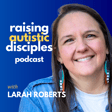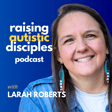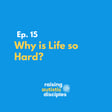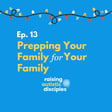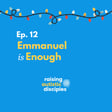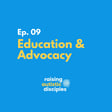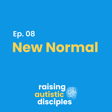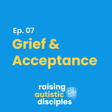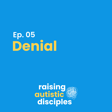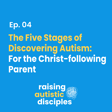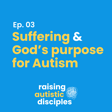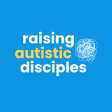Become a Creator today!Start creating today - Share your story with the world!
Start for free
00:00:00
00:00:01

Diagnosis
Join Larah and guest Katie White as they talk about the second stage of the Five Stages of the Autism Diagnosis for the Christ-following parent.
BIG News! We've launched RaisingAutisticDisciples.com! We are also launching an online support group for parents and caregivers who are raising autistic disciples. Sign up today!
Transcript
00:00:02
Speaker
Welcome
Introduction to 'Raising Autistic Disciples'
00:00:03
Speaker
to episode six of Raising Autistic Disciples. It is our aim and our joy to raise autistic disciples for God's kingdom. And we hope that this podcast is a resource for you, not only to encourage you, but also equip you that God through his son, Jesus Christ, by the power of the Holy Spirit enables us to parent our children specifically in this context, ones that are on the spectrum for his glory.
Meet Katie White
00:00:30
Speaker
Today, I have the privilege to chat with one of the funnest people on the planet, my friend, Katie White. Friend, welcome to Raising Autistic Disciples. Thank you for having me. Thank you for having fun. I love it.
00:00:46
Speaker
Absolutely. You're fun and I can go ahead and correct me if I'm wrong here. I can go ahead and guarantee our listeners that this will be one of the funnest conversations they have ever been a part of. Oh, you're sitting the bar high. I'm ready. Let's go. It is. Absolutely. Well, hey, before we jump into the conversation about the autism diagnosis stage today, do you mind if I do some announcements?
00:01:08
Speaker
Yes, I want to hear it. It's always fun when you have somebody in dialogue with analysis.
New Nonprofit Status
00:01:14
Speaker
Okay, so I'll start with some big news, some big and exciting news, and that is Raising Autistic Disciples is officially a nonprofit organization.
00:01:25
Speaker
Yeah, we're so excited officially a 5013 wait, let me start that over 501 c3 status So yeah, so we're really excited about that. Okay. Now tell me why tell me tell me what that means Yeah, so that means um friend
00:01:43
Speaker
You and I both know that This road that the Lord has us on this journey of raising autistic disciples It's hard. It's it's also Just one of the most joyful things we've been a part of as we see our kiddos excel and grow and and and us ourselves walk with the Lord through it, but
00:02:07
Speaker
I'm not sure if this was mentioned, but it's going to be mentioned a lot in further episodes.
Challenges for Special Needs Families
00:02:11
Speaker
But when I was talking to Pastor Connor about suffering, I think it was episode two, after that episode, I wish I would have stayed, wish we would have stayed recording, but he told me two statistics. And those two statistics were 85%
00:02:29
Speaker
of families with special needs kids, families that are parenting through disability of their kiddos, 85% of them end in divorce. Second statistic is 93%. 93% of families with special needs are unchurched.
00:02:46
Speaker
Those two statistics are driving Colin and I to figure out we're big dreamers anyway and we're big. We've both owned our own companies before by the Lord's grace and moved on from those but also so we're kind of entrepreneurs anyway. But out of those two statistics as well as
00:03:06
Speaker
Like I think I told you before this, by God's grace, people reaching out to us going, we're on the same journey. We're in the same season. Can you help us with this? And we, although we've been in this for three, almost four years now, we feel like we're equipped to a certain point, but we want to point people to resources that can help them specifically.
Supporting Marriages and Church Involvement
00:03:25
Speaker
Those two statistics can change.
00:03:28
Speaker
Yes. Right? We want to see marriages that are walking with the Lord and asking the Lord for help and how to parent their autistic or any disability on the disability path flourish and be what God planned for marriage to be in displaying His glory, but also that 93%. I mean, I've told people it's just a miracle that the 7% are even at the church
00:03:57
Speaker
to begin with, right? And so we want to equip the church. We want to equip those who are ministering to kiddos, as well as this is not just, I keep saying kids, it's just because the season we're in, but also autistic and disability ministry is to death.
00:04:14
Speaker
It is along the life spectrum and how to be inclusive in our church doors, in our atmospheres. Yeah, so 85% end of divorce, 93% of special needs families are unchurched. That is our aim and what pushes us forward in getting that nonprofit status because that also means that we can offer different things through this nonprofit organization.
00:04:41
Speaker
And the second announcement I kind of wanted to make is it goes along with that. We, I don't know about you and Britt Katie, but when we first got the diagnosis or we knew something's not right with our ketogram, we had no idea what to do or where to go to. We didn't have anybody in our sphere of circle of friends that were dealing with that or previously gone through it. So we want to
00:05:04
Speaker
We want to create a well, we actually a pilot program right now just to see how it goes, but a once a month support group for parents and caregivers, moms and dads, caregivers of those parenting kids on the spectrum as a means of gathering together online to encourage one another in the gospel.
Online Support Group Pilot Program
00:05:25
Speaker
to meet with folks that are in the same season or have been through kind of thing, just like what you and I are doing today, right? An online support group of parents and caregivers that are stewarding disability and the joys of autism for His glory. And so that's what we wanna offer. So yeah, so that's kind of the first step we're doing in this new nonprofit and we're really excited. Congratulations.
00:05:55
Speaker
That will help out so much with that loneliness. I feel like the diagnosis that was something we were really feeling is we didn't see ourselves in any other circles. We didn't see ourselves in our friendship circles or in our church circles and just to have community to walk life with
00:06:11
Speaker
um walk through life with is so important and I like you're hitting our church calls outreach ministry and in reach ministry and I feel like you're hitting both you're doing outreach ministry with those individuals that maybe don't feel like they have a place at the church because their family doesn't fit the typical mold and so you're doing outreach ministry where you're wanting those individuals to know
00:06:32
Speaker
that they have a place at the church, but you're doing in-reach ministry where you're reaching into ministry leaders and saying, we've got to be prepared for these families. We want to be proactive and be ready for them when they're here. And then we can equip them with help for their marriages and raising their children. And that's wonderful. I'm so proud of you all. Praise God.
00:06:51
Speaker
That's right. Absolutely. Thank you so much. Yeah. Praise the Lord. And just for those listening, pray for this. Pray for us and reach out,
Website Launch for Resources
00:07:00
Speaker
please. I mean, with this new announcement and also with the support group that we're starting, if you want more information about that, our new website, RaisingAutisticDisciples.com is now live. Go to that and that'll tell you all the information you need to know about signing up for the support group and just what the Lord is doing through
00:07:21
Speaker
Just this this podcast that he is allowing Colin and I to To launch and things like that. So we're really excited and then friend my last announcement would just be hey if you would help us by furthering our reach and that's just giving us a subscribe and a comment wherever you listen to podcasts for this one, it will help reach further people and tell these podcast platforms were here so that would be my last but
00:07:49
Speaker
Hey, I appreciate you being a wonderful audience member there for my announcements. Yes. That was an exciting announcement. I'm glad I was here for it. It is. Well, okay. I'm so thankful to chat with you, Katie. For those that have been joining us or maybe just joining us for this episode, I would encourage you to go back and just listen to the five previous episodes. They will help you understand where we're headed today.
00:08:15
Speaker
We are on episode five, but really we're talking about stage two of what we're calling the five stages of the autism diagnosis
Katie White's Personal Story
00:08:25
Speaker
for the Christ-following parent. Today, Katie's going to walk us through the stage of diagnosis. I'm going to give it over to you, friend. Tell us a little bit about you and your family.
00:08:36
Speaker
Sure. Well, my name is Katie White and I'm married to a wonderful man by the name of Britt White. And we have one child together. We actually have three. We lost two due to miscarriage before we were blessed with our son Parker. So Parker is really our third child, but he isn't only right now. And yes, he is nonverbal. He is classified a level three severe
00:09:03
Speaker
autism spectrum disorder diagnosis. He's 10 years old and is our pride and joy and we love him. We learn more through him. Sometimes I laugh because I have my master's in secondary education. I'm not using it at the moment. I am on staff at a at a church in Athens, Alabama as a
00:09:27
Speaker
Connections director I do hospitality ministry and I've worked in youth ministry and women's ministry however that a education Background has come in handy because I get to use a lot of what I learned in school on my son But then honestly he is the teacher I feel like has taught me so much about himself through my child and
00:09:50
Speaker
He's shown me my shortcomings through my child. And so I'm very grateful. I'm grateful for my family. I'm grateful for my Parker. And yeah, he's super cool. He's a cool kid.
00:10:02
Speaker
awesome. What stuff does Parker like to do? Parker is really, really good at a lot of like gross motor movement and skills. He has the best balance of anyone I've ever seen. We've kind of turned our home into autism
Adapting the Home for Autism Needs
00:10:16
Speaker
home. We're very proud of that. We don't want to have a regular home. We're not a regular family.
00:10:21
Speaker
extraordinary. So we have giant balance beam in the middle of our living room. We've got a rock climbing mountain that's actually an outdoor toy from from Target that we actually built inside. So he has a rock climbing mountain. We've got trampolines inside our home and swings and big giant exercise balls that he just bounces on all the time. He's really good at rocking and swinging and running and
00:10:48
Speaker
He's great. He's one that's hard to keep up with. We know all about that. Yes. So that's so fun. Because what we thought when Graham was diagnosed and just that journey kind of thing is we thought we needed to clear out our entire house. Oh.
00:11:07
Speaker
And it's really the total opposite of sensory needs. I'm trying to think of one we haven't heard. But like you said, put a swing up. Get crash pads. They will save you a lot of just headache as far as helping them get down to that sensory needs. And it helped with behavior. When we started seeing it change the rules, we thought our rule would always be
00:11:35
Speaker
You know, no, no jumping on the couch. That's not what kids do. Kids don't jump on the couch. That's not allowed. You sit there like a civilized individual. You realize he needed that extra sensory stimulation and he could do it in a safe environment on our couch, just allowing him to kind of get some of those bounces out, help with parenting and help to behavior. And so we really had to rethink what are the rules for our family? The rules for a typical family are not
00:12:00
Speaker
are not going to be the rules for for our child and um and it's it's helped with behavior for sure. That's such a great point such a great point. So today Katie we're we're last episode we walked through denial which um for me I think as I asked Colin about like you know what stage you you know we think back on our journey what was the hardest you saw me go through and he was oh definitely denial and so that was that was a uh
00:12:28
Speaker
therapeutic, I will say, episode for me to talk through with my friend Lizzie. But also, I'm going to admit diagnosis was too for me. It was hard. The moment was hard. We'll talk through a lot about that.
00:12:45
Speaker
Tell us a little bit about your journey with Parker, just kind of setting the stage a little bit before even diagnosis.
Acceptance of Autism Diagnosis
00:12:55
Speaker
Something's not right is kind of how it happens. Then did you go through denial at first or did you go through denial after or not at all? Sure. No, I definitely went through denial and I walked the denial stage longer than my spouse did.
00:13:10
Speaker
And I am very grateful for how patient he was with me and did not force me to make a decision until I was ready. There was a lot of prayer. He prayed for me just for me to see what my husband was already seeing. And I had a lot of pride and still do. I struggle with that. And I had my plan and for what my future was going to look like for my family. And the term special needs or autism or diagnosis did not fit into my plan.
00:13:39
Speaker
And I had a really tight grip on that and needed to be humbled. And the Lord, through the prayers of my loved ones, specifically my husband, I got there. But I did not get there at the same time as my spouse. And so he was very, very patient and supportive. And then we were there together and we were able to
00:14:02
Speaker
answer answer the call to all right we need to we need to move forward with a diagnose this and we some of those things that we had seen in Parker's life that kind of helped us get ready for that our our son still was not not talking at all you know at 18 months and so
00:14:17
Speaker
That's when our pediatrician had kind of called in early intervention and gave us some resources for some speech therapists that would be in our home and some occupational therapists. He was a severe tippy toe walker and I mean I'm talking about he could bring a ballerina to shame. I mean we were high high on those tippy toes and that was something we were noticing.
00:14:40
Speaker
There was some hand flapping and now I know what visual stimming is. There was a lot of that where he would love getting in corners and get one eye behind one part of the wall and the other eye on the other side where he could see the hallway. There were some behaviors that were a little abnormal and paired with the not speaking. And he didn't always respond to his name.
00:15:05
Speaker
We knew we needed professional help because we just wanted some answers.
Emotional Journey to Diagnosis
00:15:10
Speaker
And finally, together as a team, we walked that road and went down the diagnosis path. Gotcha.
00:15:21
Speaker
How did you respond emotionally at that point of like, okay, something's not right. We realized that step forward into, like you said, okay, we need to move forward. What were your emotions like? Sure. Well, there was a lot of, and I think I talked about my pride and then I think I went from pride to grieving.
00:15:45
Speaker
There was a lot of just, you know, and guilt. Like I felt guilty for grieving because I have this beautiful child in front of me that's happy and doesn't know that there's anything different or off. He is happy and he is himself and I was grieving
00:16:06
Speaker
the loss of a future for my child, the future that I wanted. And it almost felt like a death. It felt like the death of a plan and a hope for a future for my child.
00:16:18
Speaker
And I felt very guilty for my grieving. And the Lord gently through His Spirit had to show me that just because I'm grieving doesn't mean I'm not grateful for my child. They're not mutually exclusive. You can be grateful at the same time. And so I was grieving.
00:16:38
Speaker
the journey and the hardships that now my child was going to have to walk. And that's how many any mother would grieve that, any parent would grieve that. But I was grateful that the Lord gave me a beautiful child. And through this child, I was going to learn a lot, learn about a lot about a community that I didn't know much about.
00:16:57
Speaker
and learn a lot about the Lord through it. So my and there was also a lot of fear. I feel like 2015 that was the year before our diagnosis year and I don't know if you all ever like at the end of the year you pick a word that kind of sums up that year. It's kind of one of our traditions we do on like New Year's Eve or New Year's Day is
00:17:17
Speaker
So what do you think about last year? What's the year for last year? And girl, we didn't, we didn't even need to wait till the year was over. We knew like 2015 was the year of fear and the Lord made us versus, you know, Isaiah 41 10, like fear not for I'm with you, be not with you. I'm your God. I will help you. I'll uphold you with my righteous right hand. We were having to cling to these verses of just, you are not alone. We felt so alone. We looked around.
00:17:46
Speaker
didn't see ourselves in any of our circles. We felt so alone. We had no idea what our future would look like. And God reminded us, fear not. I am with you. I'm gonna help you. I know what's going on. And so we received peace, but it was a fight. It was a fight because our flesh would want us to fall back into fear. The Lord was like, grieve and be grateful and walk with me and cast out that fear because I have a plan. You don't see it yet, but I have a plan and I'm ready.
00:18:15
Speaker
So, yeah. That's right. Absolutely. And it is, it's holding that tension of, I remember just a separate situation in our life is when I learned what lament actually meant. And that's holding God's promises in one hand and the pain in the other, but his promises will always win, right? And that's what absolutely what you just said in those passages are ones that we cling to as well.
00:18:41
Speaker
And lamenting is worship. Like I don't think that either that in my grief, like if I'm grieving and yet I'm still praising God, we see that all throughout the Psalms, you know, like especially like David, where he's got such powerful emotion and grief. And yet in his grief, he's still praising God.
00:19:00
Speaker
That's a beautiful song of worship. That's right. I had never looked at it that way, so yeah. Right. Well, hey, that's part one of the next episode, which is going to be grieving. Yeah, so we just kind of covered it. So that's your little teaser for next episode, which will be grieving because it is a stage, right? Just like the diagnosis one, it is a stage of that. And so we'll talk a lot more. And Katie, hey, this is your invitation. You may even join me on that grieving episode.
00:19:27
Speaker
Oh, I would love to. I've got great resources and books that have helped us through that. I'm here for you.
Preparing for Autism Diagnosis
00:19:34
Speaker
Awesome. Well, hey, just because there may be some friends of ours out there who are right at taking that step of, okay, something's not right. We've sought good counsel and we've witnessed our child
00:19:51
Speaker
have these behaviors or things like that, we need to go get a diagnosis. I think it would have been so helpful for me and Colin to have had someone tell us, this is what you're going to experience. These are the questions to ask. Though we can't exhaustively in this one episode provide the hundreds of questions that were rolling through my mind, but
00:20:12
Speaker
Could you help paint a picture of visually, but both also practically of what somebody when they make that phone call or step inside that doctor's office, what's about to happen? Sure. For us, we heard the word autism for the very first time through one of those early intervention speech therapists in our home.
00:20:37
Speaker
Our pediatrician was a little slow to say that word around us. He just wasn't confident enough yet in his ability to diagnose. And so we had not heard it from our pediatrician, but when that speech therapist was in our home, the Lord put her in our home to give us that extra push where she said she saw autism. And she recommended us meet with a professional that would be able to diagnose him and see
00:21:05
Speaker
that was in fact the case and I think I was again fearful for the diagnosis because then it became like real and permanent and I didn't want a label to around for the rest of his life and I thought it would do this this diagnosis could do him a
00:21:24
Speaker
more harm than good and that was all lies from the enemy. When we finally decided that after all of the concerns that we had as a family and we wanted to know for sure if this is what this was and we met with professionals, our diagnosis journey was two different diagnoses. We had an educational diagnosis first in 2016 and then we had a medical diagnosis in 2019.
00:21:50
Speaker
And I didn't know we needed two different diagnoses. That was something I learned later on. The educational one was for us to get the help at the public school system. Parker's daycare was phenomenal at walking us through that early stage of grieving and lamenting.
00:22:09
Speaker
But they were not equipped yet to handle some of his severe needs. And they knew we needed more help and could get some of that in the public school setting. But we needed the diagnoses to get the ball rolling.
00:22:22
Speaker
with an IP and all of the things to get those occupational therapists and physical therapists and speech therapists in the school. So we got that educational diagnoses. We walked in and I was so disappointed because I felt like I wanted Parker to do his very best. And I know he could do so much more. He was just not in it that day. And now that I know what stimming is, he was so uncomfortable in that environment because it was not in my home.
00:22:51
Speaker
It was done, you know, the first one was done in an educational setting and the second one was done in a psychologist's office.
00:22:59
Speaker
The medical diagnosis was done there and there was a lot of stemming because he was uncomfortable and he did a lot of pacing and rocking and all the different activities they were trying to get him to engage in. Things would not respond and then my personality is the mama. I'm like, well he can do it. I'm going to show you. And they're like, no, no, no. They're like, it can't be you. We want to see him. And I had to remember they don't need to see him at his best. They need to see him on a regular day to get a true picture
00:23:29
Speaker
of what he's like so that they can give us the best help. We want him to be him, and oh yeah, it was frustrating. I wanted him to get an A-plus on that instead. He did not, but he at least did his best, and I'm proud of him for that. Right. Absolutely. Yeah, ours was the same experience.
00:23:53
Speaker
when we made the call and was like, okay, we need a, like you, I think we needed a psychiatrist like signed off on the diagnosis for some reason. I think maybe we were looking into therapy at the time. And so we did that. I'm going to tell you, before I tell you the story, I want to tell those listening, if we've learned anything in the last four years, it would be the art of scouting.
00:24:21
Speaker
And what I mean by this is I'll give you an example. Our daughter is a middle school cheerleader. Pray for us, please. And what we've had to do is because the boys love to watch football, like they love to watch, you know, step in the stands and eat popcorn and whatnot. But what we figured out is we better go scout out.
00:24:41
Speaker
that venue before we get there. Because if that football field does not have a fence around it, Graham is on the field. He wants the ball. He wants it. So we have to go scout. So we've learned that art of scouting. It takes some extra time, but we love road trips anyway. What I would encourage you to do is if we had gone and scouted out,
00:24:58
Speaker
This is something they don't tell you Katie like they don't like there's no rule book. There's no playbook to parenting autism I mean the Bible is what we go to right? But in these practical as far as scouting out if we had gone to this psychiatrist office It really wasn't a doctor's office. It was more like one of these therapy where they just housed a doctor inside the venue inside the facility so we walked in and
00:25:26
Speaker
because they're doing therapy, there's this humongous inside indoor playground. So we had to walk past it to get to his office. Well, there ain't no recovering from that. No. Sweet boy just wants to get on that slide, that swing. So we drag him into the psychiatrist's office. And like you said, he showed every
00:25:53
Speaker
everything, the whole gram, the whole gram it is what we call the whole thing. He showed them all, which like you said, hindsight is we're grateful for that. But just a word of caution and a word maybe just of, hey, a few steps ahead of those who are going to get diagnosis, scout out your venue first. Not saying it's going to help, but maybe if you know that there's an indoor playground that they're going to get distracted by, maybe you can ask, hey, can we go through a back door somewhere? So, you know, that was challenging.
00:26:23
Speaker
Yeah and asking those questions like how long is the waiting list? Like I thought that we could get a diagnosis quickly and then learned that there was quite a long months and months long waiting list. So yes asking those type of questions just so you can be prepared and also asking if it's not a psychiatrist or psychologist that is doing the diagnosis and it's just an education professional. We thought that would be sufficient for insurance
00:26:53
Speaker
therapies later on and it was not. And so we actually had to go back and do it again. That educational diagnosis was enough for the school, but it was not enough for insurance. Insurance wanted it to be done by a medical professional. So we had to go back and get it done a second time so that we would have insurance coverage for our private therapies. Wish someone had told me that. Right. So there's a difference. There's two different educational route or therapy route. Okay. Gotcha. Yeah.
00:27:21
Speaker
That's good to know. Good to know. Well, as you went, the doctor, whoever wrote that diagnosis, gave you the diagnosis, you and Britt, you're reading over it.
00:27:37
Speaker
What are some of the, and I'll go practical route and then we'll talk again about what did that do spiritually and emotionally, but practically when you're looking at that document, what are the main things that you're looking for as a parent to know that, hey, this is helpful, but just for somebody who's looking at a document for the first
Understanding Autism Diagnosis Labels
00:27:54
Speaker
time?
00:27:54
Speaker
Sure, sure. It's a lot of reading. And so I think not to get overwhelmed by all of the data. I mean, the diagnosis, yes, it said for Parker level three, you know, and that was something that we knew the diagnosis was, I shouldn't say we knew, we were fairly
00:28:13
Speaker
confident that was on the spectrum. We had kind of already accepted that through the whole long waiting list before we actually got the diagnosis. We had been with enough professionals in our home through early intervention that we had kind of accepted that through that waiting stage, but I was not prepared for that label to have that level three by it. So, you know, again, level one, two and three, one is going to be the least amount of support needed. Level two is moderate and level
00:28:39
Speaker
three is a severe uh substantial I believe is the word they use a substantial amount of support needed for the child we we weren't prepared for that level three I think that got me in in in the fields because then I missed
00:28:54
Speaker
This sounds terrible. I knew we were different, but then I kind of even felt like we were the different of the different, if that makes sense. And again, going back to those labels, because that's what we kind of say that diagnosis is, is it's a label. And I think I needed to hear in that moment, don't get overwhelmed by all the paperwork. Don't get overwhelmed by that level three. It's not a negative label. This is something to help you, to equip you, to put the
00:29:21
Speaker
puzzle pieces in place to get that help that you need, helping the home, helping the school to get you resources. This is to help you and to see, I mean, goodness, we know as believers that, you know,
00:29:35
Speaker
What we are labeled as children of God, what we are labeled is daughters of the King. We are fearfully and wonderfully made, made in the image of God, um, of infinite value and worth. Like that, that is our label and that can not, in a way, we go back to creation and, and he created us in his image and it was a good period. Good. Then he gave abilities and dominion and jobs and things later.
00:30:00
Speaker
and said it's good. So my child is good. His life is good. Just because this diagnosis came does not mean that he is a less complete picture of God and of God's kingdom. And so it was almost when we got that diagnosis, I was having to start preaching to myself because the enemy was just telling me all these lies about
00:30:25
Speaker
my son being broken and my son being less than and being an incomplete picture of God's glory and that is just not scriptural. That's right. Absolutely. Preaching the gospel to ourselves daily is one of the things that I have had to learn and put into practice, but also I'm going to be honest with you, that word label is a trigger word for me anyway, just because of past things in my life, but also I can deal with, well, let me back up.
00:30:53
Speaker
The Lord has had to in my sanctification work on that label in many ways and into adulthood as well. But also it was one of, you talk about pride, you can label me all day. And I'll walk that journey and deal with it. You label my kid. Woo! Yeah. So Mama Bear comes out real tough. And so that's what the Lord had to walk through. And let me ask you this.
00:31:18
Speaker
And several people have asked me, and I may not know how to articulate this best, so I want to ask you this question. Did it bring freedom?
00:31:26
Speaker
Yeah, I think we find, yes, yes, I think it did. We finally had, we finally had an answer. We finally had an answer for all of the questions of why, why, why does my son like to do this and not this? Or why, why do all the other children, you know, for example, my son, it was on a playground, all the other children want to play on the playground.
00:31:49
Speaker
But in that moment, Parker, there was a mulch, this blue rubbery mulch. All he wanted to do was pick up the mulch and watch it fall. And watch it fall to the ground and kind of, oh, okay, autism. They have sensory differences. So he is sensory seeking and we need to have
00:32:09
Speaker
Magic sand in our home. We need to have well, you know, and I remember my parents were so great We went to the lake and they bought we it was very quickly after our diagnosis and they went and they bought a big baby pool size thing of just mulch Like he and I remember Parker he didn't want to swim at that stage All he wanted to do was sit in that babytub with all that mulch and he was getting it all over himself
00:32:32
Speaker
We had a trunk or tree at our church. I have a video. All the other kids are wanting to walk around and go get the candy. My kid doesn't eat candy. He wanted to find the nearest flower bed and he got in that dirt and he was hit and thrown and we've got the cutest video and it gave us freedom where it was like, you know, don't and this is something that I learned.
00:32:54
Speaker
don't try and thrust neurotypical types of fun on your child. If your child is a trunk or treat and they don't want to walk through the line to get the candy because by golly, they don't eat candy. They want to go over there in that flower bed and explore that mulch. Celebrate that. Absolutely. Go get dirty with them. Go videotape that. That's precious. That is their type of fun. And so there was freedom. It's fun, man. Like we're going to do our own type of fun because we're different and we're
Celebrating Autism's Unique Joys
00:33:23
Speaker
proud of it.
00:33:23
Speaker
That's right. Absolutely. I think that is so, man, that's such an encouragement to me, friend, and also to those I know listening is, listen, this journey, this, what the Lord has given us to parent a child on the autistic spectrum, there's a lot of hard, right? There are a lot of hard days, but you have to, and this is just like these stages we're talking about. This is a process, but also, man, like,
00:33:50
Speaker
for so long, you can only see what's right in front of your face, right? You can only, you can't see it. But if you can, and I know, because as believers, when we have the power of the Holy Spirit living in us, begin asking the Holy Spirit to help you see outside of just what's right in front of your face. And then what happens is exactly what you're talking about. We then be able, are able to see this diagnosis and
00:34:13
Speaker
Uh, uh, not saying that the heart goes away, but you're you you're you're able to see the joy in it and man that comes with triumphs of when they learn something new that comes with Different things that oh, I didn't see it that way i'm gonna join in with you playing in the dirt, right? Because it brings you so much happiness. Um, um, I that's what I encourage uh parents listening caregivers just Just join in like you said join in in that fun and in in changing the expectations something like
00:34:43
Speaker
you know just celebrating every win don't you know we have something called a Parker praise log in our house and we started it after the diagnosis it was something a friend had told me to do because you said so much is negative and we celebrate the wins and I think the diagnosis also taught us
00:35:03
Speaker
We don't take anything for granted because we understand that not everything's promised. I think a lot of people take for granted the ability to have a conversation and the ability to use their voice. And I have a child that right now, his voice is through a talking device, is through an app on his iPad. So I don't take the gift of voice for granted. And so we, every little win, we changed our expectations.
00:35:27
Speaker
Every little win we wrote down, you know, when he was able to kick a ball, we wrote down the date and we thanked God for that. I remember when, um, unprompted, he, uh, I said, I love you. And he blew me a kiss. I love you back. I hadn't gotten that and still haven't gotten that out of his mouth and maybe never will. Uh, but you know what? He blew me a kiss on prom. We wrote that down to other, to other parents that that to them.
00:35:55
Speaker
Not a big deal, but to us, it was the world. And so we changed our expectations. We wrote everything down. We stopped comparing ourselves to other people. And I think that was hard, but the diagnosis helped us say, hey, stop looking around. You've got a different journey to walk. And you know what? It's going to be an adventure. That's right.
00:36:17
Speaker
So celebrate, celebrate the wins, change those expectations, and love your child for who they are. Stop trying to make them into a mold of something that they were not created to be. That's been a journey. We've had to learn that. Right. Absolutely. Such a great idea to write down wins and celebrate. I mean, that's what writing down does, right? So we don't forget.
00:36:39
Speaker
So write down those wins and celebrate as you look back and journaling. That was going to be my next question to you, friend, is what have you learned in the diagnosis? And I know for me, like with anything, let me give you a few examples of just what
00:36:54
Speaker
helped me because just like with any diagnosis, you get a cancer diagnosis, you get another health diagnosis of some sort or just new news in general, you didn't know the day before what that even entailed, right? I think what I would love for to equip those who have never been touched by autism is understand like we didn't bring home a baby from the hospital and then say, oh, he has autism.
00:37:20
Speaker
like I mean I'm not going to go into all like sure there may be research out there where you can tell in the womb that I haven't researched it enough but what I'm saying is I do believe it is it is from birth but you still don't know that until these these signs start developing so so it's something that like that is why the first stage is something's not right right so it's not like something you just know from you know that but I will tell you what it is taught Colin and I
00:37:48
Speaker
It's taught us many things, the diagnosis, but in a sense, it's taught us, what else are we not seeing? Not talking about with Graham. I'm talking, what else are we not seeing around us happening? For instance, you and I have a mutual friend and her name's Robin, and before she, because she was one of my maids of honor in our wedding,
00:38:11
Speaker
and her husband Stephen did a tour of serving our country. Before I had a friend who had to, her husband left to defend the United States, our freedom, I had no idea what it was like to care for a friend or anybody that had to parent
00:38:31
Speaker
solo while worrying about your husband. Also, I didn't know, right? But I had Robin to help equip me in that, but it was because it was something I wasn't looking for, right? I think we can both agree. I think our parents would agree too that autism wasn't on the radar. So we didn't really even
00:38:48
Speaker
discuss or we had no until it's touched by you don't know so what it taught Colin and I is what are we not seeing around us? Am I not seeing you know we have a blind lady in our small group never would have known the the impacts that has on her going to our church going grocery shopping unless she would have not come to our growth group.
00:39:07
Speaker
small group. Now I know this is what that community is dealing with, right? So until you're touched by it, you don't really know. So that's what Colin and I have been praying. What else are we not seeing around us? That God is trying to go, hey, wake up to this. This is out there. These people need the gospel just as well, right, that are going through these challenges. So that's been a big thing for us is my prayer is to have eyes that see.
00:39:30
Speaker
Yes. My husband and I talked about that last night when we were kind of prepping for the podcast, like just the apathy that we had to those around us, to the needs around us. It's really sad, but you know, we were saying it had to happen to us for us to care about it. And that beats my heart. Like I wish this is the disability community, right, is the largest minority group in the world. And yet we had nobody with a disability in our circle. We were not loving
00:39:59
Speaker
those outside of just what we looked like and who we were like and that now the diagnosis has freed us of that and has opened doors to love those that are hurting and to look outside our circles and see how we can serve and I'm grateful for that and the diagnosis also has opened doors for us to love. I now have much more medical people in my life that I can
00:40:28
Speaker
love and share the gospel with I mean we have so many different specialists and doctors and nurses and we've got you know therapists we've got
00:40:38
Speaker
speech therapists and occupational therapists and all of the therapists. And these are lives. These people represent lives that need the love and the truth of the gospel. And our diagnosis opened the doors for now, these people come into our home.
Ministry Opportunities through Autism
00:40:54
Speaker
These people in our home where we can pray over them and thank God for them. And thank the Lord for the diagnosis that opened the doors for ministry, for us to love on the disability community and also on the medical community.
00:41:08
Speaker
That's right. He ordains all things, and it's all things for His glory, marks our steps towards people, situations, and places, and so that's, yeah, absolutely. I see that, and Lord, make us aware of those around us that do or lost, and we have the perfect avenue, the perfect segue to share the gospel with them. I have one more question for you, but I know some people may have caught on to something you shared a little bit earlier that I'm going to ask you. Can you tell us a little bit more about Parker's talker?
00:41:36
Speaker
Yes, yes. So Parker uses the app called LAMP, Learning Acquisition and Motor Planning. So it is an app that you can get just from the app store. It is a little pricey, but they are in the past. They have put it on sale during autism month, which I believe that is April. And so we bought it during April when it was a little cheaper.
00:42:01
Speaker
and it is an app that gets put on an ipad and so on his ipad and it is designed specifically for him we know how to create buttons and they're very very specific like he can tell me you know i want white cheddar cheeto puffs
00:42:17
Speaker
Or he can tell me when he wants, goodness, grape juice as opposed to, you know, strawberry kiwi juice. All of that, all of his favorites. We've got pictures of the rock climbing mountain or the sensory room at church versus the sensory room at school. All of his teachers, their pictures are on there as friends, you know, in church, their pictures are on there. We've added things about the Lord, you know, prayer and
00:42:44
Speaker
And Jesus is on there. And so it is opened up the door, girl. We're like, it's how we communicate with him. He was not able to do the fine motor like signing. We tried signing for a while and he just did not have the ability within his fingers to do the movements for the signing.
00:43:01
Speaker
And so we went the route with him with the pictures and we like the pictures on the iPad. It's taught him to read. He can read because he had to learn to read because that's how he was communicating was through those pictures that have the word right there. And it has opened up the door for communication. And my prayers have changed. It used to be for the longest time I prayed for Parker to speak. And that's still a prayer of mine. I'm not going to lie. Like I still would love
00:43:31
Speaker
Parker woke up tomorrow and started speaking words to me. I taught public speaking in the schools. I was a girls ministry director and so my job is counseling and communication and I have a child that has a communication disorder and is not able to connect with me in that way and
00:43:49
Speaker
And that is something I've had to grieve. He was at the age where all those parents were getting to have conversations with their kids about anything and everything, about Jesus and what does this mean in the Bible? And oh, I remember mamas would complain. My kid keeps saying, mama this, mama that, mama this, mama that. And I just thought, oh, if you only knew the gift that you have, you know, because we don't have that in our home. We do, but it's different. It is through that device.
00:44:17
Speaker
It's through that device and the Lord changed my prayers where
00:44:20
Speaker
Instead of just praying now for verbal speech, I pray for communication. It's not about me hearing the words through his voice. I just want to know what's going on inside his head. And this technology has opened up an avenue where I get a picture of what's going on in his head. During the pandemic, he actually hit the button for miss people. He said he missed people.
00:44:47
Speaker
And I was like, well, buddy, I do too. I didn't know he was going through that. But because of that device, he was able to tell me that he missed being around people. And I'm very grateful for that device.
00:45:00
Speaker
Wow, praise the Lord. Hey, that right there, before we wrap this up, that is a fantastic example, friend, of here's where I think us as parenting autism gets stuck at, is that we just don't know how. We don't know how, and we think because my kiddo can't communicate, then they never can learn the gospel.
00:45:25
Speaker
That's or because they it's not true because they cannot verbally tell me Um, uh the articulate the gospel that he that they don't know or they're not aware of it But you and brit have have through that talker redeemed technology Um so that he can Believe and confess repent and and be saved, you know, we pray right and so how is that like like walk some walk apparent through that of of
00:45:52
Speaker
that by all, do whatever you can. Whatever means that you are learning through your child is able to, and we have some listeners that, you know what, their sweet kiddos may be in a wheelchair and not able to communicate anything, but you sing praises, you speak God's word over them, because just like we've learned in previous episodes, God knows and He knows their heart, but you've got to do something
00:46:19
Speaker
Yes, and start somewhere. I think for us, when we were starting with the signing, we were going through scripture and we were learning American Sign Language with Parker because we were not familiar with ASL. We didn't know. So I'm getting out YouTube videos and I'm trying to learn
00:46:37
Speaker
different verses and sign language. And so then what we would do is we would take it, we would record ourselves and we would take his hands and we would have him as we're speaking the truth, we would move his hands and we would sign. And we were hopeful that eventually he would pick that up and be able to do it on his own. It didn't work, but that doesn't mean it wasn't a failure. Like we know in scripture that the word never returns void. And so us just even starting somewhere with sign language and him getting
00:47:05
Speaker
getting the hand motions. Then we started trying to do a little bit more like body movement or body motions because we learned Parker is one that learns best when he's on the go and moving around.
00:47:15
Speaker
And so then it turned into, we go for walks now all the time and we prayer walk. We prayer walk all the time and we'll take a stalker with us and we will go on walks and while I'm presenting the gospel and praying, I'll ask Parker to point out things that God created or things that are praising God and their own heart language. I want Parker to understand
00:47:38
Speaker
that God understands him. Even though mommy may not, God understands you. Just like I don't understand how the trees are praising God right now in their own way, in their own heart language. Like God receives that. God receives creation's announcement of God's goodness. He understands it in a way that we can't.
00:47:57
Speaker
And Parker, just because I don't always understand you, God does. And so point out to the other things around us, Parker, that are praising God in their own heart language. And on his talker, he can say, trees, sky, flower, bird. Like, yes, you're right. God created those.
00:48:13
Speaker
right? And they are praising him. He's their creator. And so just on the go, we're talking about scripture. We have a thing with bridges and we have bridges everywhere in our neighborhood. And so we always talk about how I've drawn pictures for Parker. He's very visual.
00:48:31
Speaker
I'm a talker. You can tell. He's not. He's a little bit more visual, visual learner. And so we have drawn pictures of the cross looking like a bridge. Now we are on one side separated from God by our sin. We are over here on one side and God is over here on the other and perfect
00:48:48
Speaker
holiness. And on your best day, Parker, you can't jump to God. On your best day, you will never be good enough. Mommy will never be good enough. And so that's the bad news. And the bad news is that there were all sinners and that the wages of sin is death, but there's good news. And then we cross, right?
00:49:06
Speaker
But the free gift of God is eternal life through Jesus Christ, our Lord. And we draw the cross of Christ as a bridge. And when we're going over bridges now in the neighborhood, Parker knows he associates that bridge that we're driving over, bridges that we've drawn at home. And you, when we're going over that bridge, it's a beautiful picture of us traveling with Jesus over death.
00:49:28
Speaker
And that cross we will, that bridge of the cross will take us all the way to the father one day into glory and into eternity. And we just got to get creative. So it's there. You just learn from other mamas what they're doing, what works with your kids. Don't reinvent the wheel, you know, ask others what's working for them and their kids and then steal it because it's. That's right. That's right.
00:49:55
Speaker
Right. Absolutely. Man. Wow. Yeah. So if you're listening and you're like, what Katie just beautifully illustrated, that is the gospel. That is good news for us. That is what Jesus came. God sent his one and only son.
Exploring Faith and Community
00:50:09
Speaker
I'm not going to repeat it because she did such a fabulous job. But if you're
00:50:11
Speaker
You're like that, you just stumbled upon this podcast because you need help. You're like, I have an autistic child. I don't know what to do. And none of that just made sense. We would love to talk to you. That is what this is all about is a disciple is just imitating that of Christ. And so we want to disciple those autistic kiddos that are in our home. But if you as a mom, dad, or caregiver have no idea that what Katie just described, we would love to talk to you about how you can make, how you can place your faith in Jesus Christ for your salvation.
00:50:40
Speaker
Yes. Amen. And don't listen to the lie of the enemy that may tell you that faith is going to be harder for your child. I really have struggled with that with God. Why would you create a child like mine where it's going to be harder to accept you because
00:50:58
Speaker
A relationship with Christ is just that, a relationship. And I have a child that has a hard time forming relationships. And you are an unseen God, Lord. And I have a son that's very visual and very literal. And so I went through a season of, God, this isn't fair. And you know what? I had to be broken of that, that you know what? God created Parker the way that Parker is. Nothing is too hard for God.
00:51:25
Speaker
all I have to do. And it's not going to be me that that saves my child. It is the work of the Holy Spirit. The only thing the Lord can't use is my silence. So I don't want to have the sin of silence. I just want to speak truth over my child and trust that God can break through to my child in his own way because God created him.
00:51:46
Speaker
And nothing is too hard for God. And so just putting your yes on the table that yes, I will speak truth. I will present truth, whether it be through creation or through silly little pictures, whatever it is, put your yes on the table. Don't fall into the sin of silence and the fear.
00:52:03
Speaker
that my child just can't get the gospel. That is a lie from the enemy and you speak the name of Jesus over that and you fight that. That's right. Absolutely. Absolutely. Well, that's absolutely such good, just practical, but also reminding each other of the gospel. Katie, one last thing as we wrap up this diagnosis episode, what would you encourage parents and caregivers with as we end?
00:52:29
Speaker
I would just encourage them with allow this to be an opportunity for you to fall back in love with the Lord. This diagnosis will be a sanctification tool for you. And what that word means, sanctification, that means you becoming more like Christ. That's right. God will use this diagnosis
00:52:49
Speaker
to make you as the parent a better picture of his son. You will start seeing even disability in scripture. You will start seeing stories like Moses will take on a whole new meaning. We see Moses had
00:53:04
Speaker
had a stutter. He had a disability where he was not a good communicator. And instead of him sitting on the sideline and saying, oh, I'm different, so I can't be used, God accommodated for him and provided Aaron to help him and to be that mouthpiece
00:53:21
Speaker
during his weakness and you'll start seeing how God values individuals with disability and wants to use them. You'll fall in love with Jesus all over again. You'll see Paul and his disability as he had a thorn that he prayed for it to be removed. And the Lord said, in your weakness, right?
00:53:40
Speaker
I'm strong. I'm strong. We allowed that disability and that weakness to remain because he knew it made Paul more dependent on God and stronger. And that will happen to you as well. So fall back in love with the Lord. Allow this diagnosis to transform scripture, to transform you into a better picture of Christ.
00:54:01
Speaker
And you will have days where you will actually see the good, more of the good. You will start seeing disability, not from a less model, or a loss model, where my child lost this ability, lost this ability to talk, lost this ability to connect, lost this ability to walk.
00:54:19
Speaker
you will start seeing it as a more, is that because of disability, I have a better picture of the diversity of creation. I have a better picture of God's love for the different and the outcast. He will make you more like his son through this and you can rejoice for that.
00:54:35
Speaker
Praise God, we are here to glorify Him and enjoy Him forever.
Glorifying God through Autism
00:54:40
Speaker
Nothing passes through His hands that is not sovereignly ordained for us to have, and He has given us for such a time as this autistic kiddos to steward for His glory. Thank you.
00:54:50
Speaker
friend. Man, thank you so much for just sharing your story of Sweet Parker, you and Britt. I'm just grateful for you and I know those listening are as well. And so this is episode five, oh no, episode six. We're just talking about the five stages of the autism diagnosis for the Christ-falling parent. And this is, we've just been talking about the
00:55:12
Speaker
the diagnosis stage. We encourage you, if you haven't already, listen to the previous episodes, but I'm really excited about the next episode that you will hear. We're taking a break just because these last two episodes, Katie, have been a little bit weighty in the sense of just going through this. The next episode is a fun one. Let me tell you, it is Colin talking with one of our good friends. His name is Josh and they're
00:55:36
Speaker
they're just two dads talking. We're kind of taking a break from the five stages just to give a little bit of life-hearted story type of episode and then we'll fit back up with grief after that episode. But yeah,
00:55:53
Speaker
So just the next episode is just two dads talking. That's the title. And they're just talking about autism, how to do that. And I'm grateful for fathers like Colin, Josh, and Britt, who are stewarding our family as well. But also just sometimes for dads and for men, it's a little bit different talking about parenting and things like that. So that's what they're going over in that episode. So I encourage you to listen to that. But thank you for listening to Raising Autistic Disciples for God's Kingdom. Have a great day.
